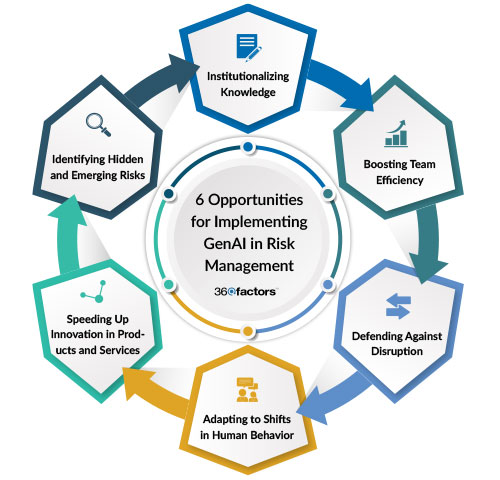Home/ Blog / 6 Reasons to Leverage Gen AI in Finance for Advanced Risk Management
Risk management continues to become more challenging due to swift market volatility, regulatory shifts, and technological advancement. Conventional strategies are no longer sufficient to deal with these challenges efficiently. That is where the role of Generative AI comes in, providing innovative solutions enhancing risk management for financial organizations. The ability of Gen AI to process enormous amounts of data, detect trends, and produce real-time insights is transforming the way risks are detected, evaluated, and mitigated.
From centralizing knowledge across organizations to safeguarding against disruptions, Gen AI in finance allows financial institutions to take a data-driven and proactive approach to risk management. The dependency on individual expertise or manual procedures is no longer in use; companies can utilize the full power of AI to make an accessible and shared knowledge base, fostering team efficiency and guarantee consistent risk mitigation approaches throughout the board.
Gen AI makes smarter, faster, and more comprehensive risk management approaches, from driving innovation to automating regulatory reporting in products and services. This blog will dive into six key opportunities where Generative AI in finance can modernize risk management for financial organizations. Discover how this technology is facilitating companies to innovate, adapt, and thrive in a growing economic landscape.
6 Opportunities for Implementing Gen AI in Risk Management
Financial enterprises deal with the ever-increasing complex risk environment; generative AI in finance provides powerful tools to improve risk management approaches. Let’s uncover the six key opportunities of gen AI for effective risk management.

1. Institutionalizing Knowledge
A significant part of operational knowledge typically stays within teams or departments in financial organizations, whether it’s an experienced risk manager’s insights or regulatory nuances. This reliance on segregated human expertise creates noticeable vulnerabilities, precisely when staff turnover happens and specialized knowledge is not documented successfully. Gen AI helps resolve this issue by allowing financial enterprises to institutionalize knowledge.
With Gen AI in finance, companies can capture and structure key insights across departments, enhancing them into an accessible, shared knowledge base. This tech can automatically deal with broad amounts of internal documentation, historical data, and risk assessment, combining them into actionable intelligence that anyone in the company can utilize. This avoids knowledge loss and ensures that risk management approaches remain the same and effective, regardless of workforce changes. Additionally, the ability of generative AI to consistently learn and update guarantees that institutional knowledge changes along with industry patterns and regulatory updates, helping companies to stay informed and agile.
2. Boosting Team Efficiency
In today’s environment, swift decision-making is significant, and the capability to improve team efficiency without losing accuracy is paramount. The automation capabilities of generative AI in finance enable risk teams to streamline recurring and time-consuming tasks, freeing up significant time for higher-level and strategic decision-making. For instance, regulatory reporting, monitoring compliance, and data analysis can be automated with AI, guaranteeing that regular activities are managed efficiently and accurately.
Furthermore, artificial intelligence in finance can analyze massive data sets far quicker than human analysts and spot trends and possible risks that may go unnoticed. By getting real-time information from financial firms, regulatory changes, and client attitudes, Gen AI in finance offers timely insights that aid risk teams in making improved decisions on time. This leads to enhanced productivity while sustaining high-risk standards of risk control.
3. Defending Against Disruption
Financial enterprises are typically subject to disruption from several sources; it may be due to changing market conditions, technological advancements, external events, or regulatory changes. Such interruptions can pose noticeable risks to profitability, operations, and reputation. Gen AI strengthens financial organizations to safeguard these distractions by providing advanced predictive expertise.
Gen AI can spot early warning signs of potential interferences in operations by ongoing monitoring and analyzing a broad amount of real-time data. For example, it can analyze world market patterns and social media sentiments to predict changes in market conditions or spot new areas of regulation. Identifying emerging risks in real-time allows financial enterprises to respond proactively rather than reactively. Gen AI in finance helps organizations develop eventuality plans, adjust strategies swiftly, and mitigate the impact of disruptions before they rise into full-scale crises. This proactive risk defense enhances an institution’s resilience and builds trust with clients and stakeholders.
4. Adapting to Shifts in Human Behavior
Human behavior is unstable yet influences the financial market, regulatory landscape, and consumer patterns. Understanding such trends is paramount for successful risk management if it transforms consumer expenditure habits, market fluctuations, or changes in workforce behavior. Generative AI in financial services improves organizational capacity for analyzing broad amounts of negotiating data, detecting trends, and offering insights that help financial enterprises stay ahead of the curve.
For instance, Gen AI in finance can deal with extensive scale data from social media activity, consumer transactions, and customer interactions to identify transformation in spending or preference trends. By making sense of such subtle changes early, financial institutions can adjust their approaches to decrease risks related to changing consumer attitudes, such as reduced demand for services or enhanced interest in alternative investment products. Additionally, this AI-based strategy can be applied to workforce changes, facilitating organizations to adapt to altering employee attitudes, predict skill gaps, and manage internal risks more successfully.
5. Speeding Up Innovation in Products and Services
Innovation is at the heart of sustaining a competitive edge in the financial industry. Therefore, conventional product and service development strategies can be gradual and resource-intensive, typically taking months or years to bring the latest offering to the market. Gen AI in finance speeds up this procedure by harnessing its strong capabilities to drive instant innovation. By automating the research and development process, Gen AI can analyze enormous data sets, customer feedback, and market patterns to spot gaps in the market and produce new product ideas.
For instance, AI can suggest innovative financial products tailored to clients’ evolving needs, such as personalized investment portfolios or dynamic insurance offerings. Financial enterprises can also use Gen AI in finance to simulate product performance in various market conditions, significantly shortening the time it takes to bring new services to market.
6. Identifying Hidden and Emerging Risks
One great Gen AI in finance applications for risk management is its ability to explore risks that are not instantly visible to human analysts. This ability is helpful in the financial industry, where risk is often buried within challenging data sets or hidden beneath surface-level metrics. Gen AI goes beyond traditional risk assessment methods, using advanced algorithms to identify patterns, correlations, and anomalies that indicate emerging risks.
For example, by analyzing global transaction data, regulatory updates, and public sentiment, Gen AI can identify subtle signals pointing to potential risks, such as market volatility, credit defaults, or cybersecurity threats. This is especially relevant in today’s environment, where the volume and complexity of financial data make it nearly impossible for human teams to keep up with all potential risk factors. Gen AI in finance provides the scale and speed necessary to stay ahead of evolving risks, ensuring financial institutions are prepared to respond swiftly and effectively.
Utilize An Effective Risk Management Platform to Manage Risks
While Generative AI in finance offers incredible potential for enhancing risk management, it’s essential to have the right platform to harness its capabilities thoroughly. Financial institutions must integrate AI-powered risk management tools to stay ahead of emerging risks and ensure robust oversight of their risk profiles. One such solution is Predict360 Enterprise Risk Management Software with integrated AI features. It is a comprehensive platform designed to give organizations complete visibility and control over their risk landscape.
Predict360 ERM software provides a cloud-based solution that centralizes all risk data on a single dashboard, allowing risk managers to instantly identify and assess new threats across the organization. Any changes in risk metrics are immediately reflected and accessible to the responsible stakeholders, ensuring that decisions are based on real-time information. This holistic view of enterprise risk enables financial institutions to respond proactively, helping to safeguard their operations from both internal and external threats.
The Predict360 ERM software offers a great way to integrate AI in finance, facilitating systematic risk identification and assessment across all business functions. This makes it easier for organizations to anticipate risks that impact their objectives. It also maintains an up-to-date repository of control measures and mitigation strategies, ensuring risk management teams have the insights to make informed decisions.
Request a Demo
Complete the form below and our business team will be in touch to schedule a product demo.
By clicking ‘SUBMIT’ you agree to our Privacy Policy.



